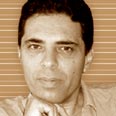
Hate parade lessons
Pride parade exposed dark corners of Israeli society
The public discourse and arguments between the sides focused on the question of to-march-or-not-to-march through Jerusalem's streets. The same was true for the media coverage and the legal procedures that involved mutual petitions to the High Court of Justice and the attorney general.
Yet those are only implications of a much deeper and more worrisome phenomenon, and treating the symptom, the way it was done during the mad dance of the past week, did not dare touch even the tip of the burning problem, which is growing below the surface. In order to address those hidden demons, we need a brave and comprehensive treatment.
The statements uttered by the Orthodox who dared face the cameras and microphones were outrages and repulsive. They ranged from pathological "assertions" such as "ill" "infected" and "disturbed" to loaded statements such as "criminals", "deserving of death" and "terrorists," no less. Such labels and images stem from intense, vigorous urges whose frankness and authenticity cannot disguise the hatred and loathing inherent in them.
The verbal and ideological attacks on members of the gay community revealed a hair-raising worldview that stimulates and unifies tens of thousands of people at the heart of the State of Israel; This crude, frightening ethnocentric perception tramples over the other and does not allow for a living space in areas the Orthodox perceive as "their own."
Yet nobody complains or talks about this reckless tongue-lashing against citizens in a free and democratic country that according to penal laws constitutes incitement that should lead to severe legal sanctions. Nobody says a word: The courts, the police, and not even one Orthodox leader, educator, or writer.
Again, as always, the response shown by authorities, the media, and the general public, is immediate: The riots at certain areas of the capital and the frantic developments around the route of the parade, the convention's location, and the scope of the event.
Yet the pride parade is a passing event, which served as a catalyst and detector of deep, dark layers that encompass a large sector within Israeli society. Nobody wishes to address such layers, yet they will not disappear or go away, but rather, erupt with more force at every opportunity and continue to strengthen against the backdrop of the systematic fear members of this faith sowed in the streets.
Conservative, violent worldview
One of the main areas of this unbridgeable gap between the two approaches to life that erupted in Jerusalem in the past week is the unequivocal guidance and comprehension that the Orthodox imbibe from Jewish law and its application on the general public. The second aspect is the inability of non-Orthodox to grasp the deep and severe implication of this perception.
Where does the brutal animosity and hostility to gays and lesbians stem from? According to fundamentalist interpretation of Jewish law, those are dysfunctional people that do not fulfill the commandment of procreation and do not impregnate or get pregnant. This serves as a Jewish law disguise for despising those who are different, not understood, and therefore threatening and scary.
Below the cloak of splendor and sanctity donned by these rioters rests a conservative, reactionary, coercive and violent worldview. What would the Orthodox do had Jewish law marked the left-handed, elderly, and all those above six feet or blue-eyed as unworthy and deserving of stoning? Indeed, much work would be needed to make sure Jerusalem remains "clean."
And why is this so important and vital to our existence as an Israeli society? Because the delicate social fabric our society is premised on is fragile and temporary. Any shakeup may pierce it, with no possibility of recovery. Such despicable, inhumane attitude to the other – and let there be no illusion about this, not only the gay other - cannot allow for life together.
The argument that the Orthodox community is not at all interested in living together with those who are not members of the community does not meet the test of reality. Community members and leaders know well how to take part in the public agenda when they do not like something. One cannot choose isolation when the environment is pleasant, while mixing into the environment and starting a fire when angry about something.
If the ultra-Orthodox community chooses disengagement and alienation from the whole of Israel, it must be consistent and also turn away when gay and lesbian Israelis are marching. Jerusalem belongs to the whole of Israel and is not an Orthodox estate.
And finally, the silence is more meaningful and resonates more powerfully than anything else. The thundering silence on the part of other religious leaders, Zionists or non-Zionists, Sephardim and Ashkenazim, Jerusalemites and non-Jerusalemites, Shas, National Religious Party, United Torah Judaism, or anyone else.
Not even one person condemned or expressed surprise over the plethora of verbal ugliness spewed forth during this feverish week by those who represent the guardians of morality – not even one.
Generalization – any type of generalization – is unworthy and unfair. Yet still, not even one voice that would get up and offer condemnation, that would serve as a model and salvage even a little the image of the Jewish religion? Does the homophobic abhorrence overshadow the love for other humans, whoever they may be?
Dr. Muli Peleg is a political communication lecturer at the Netanya College










